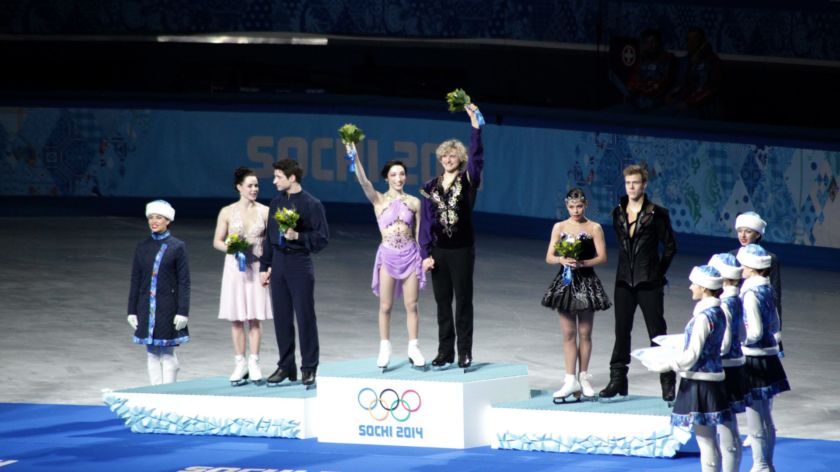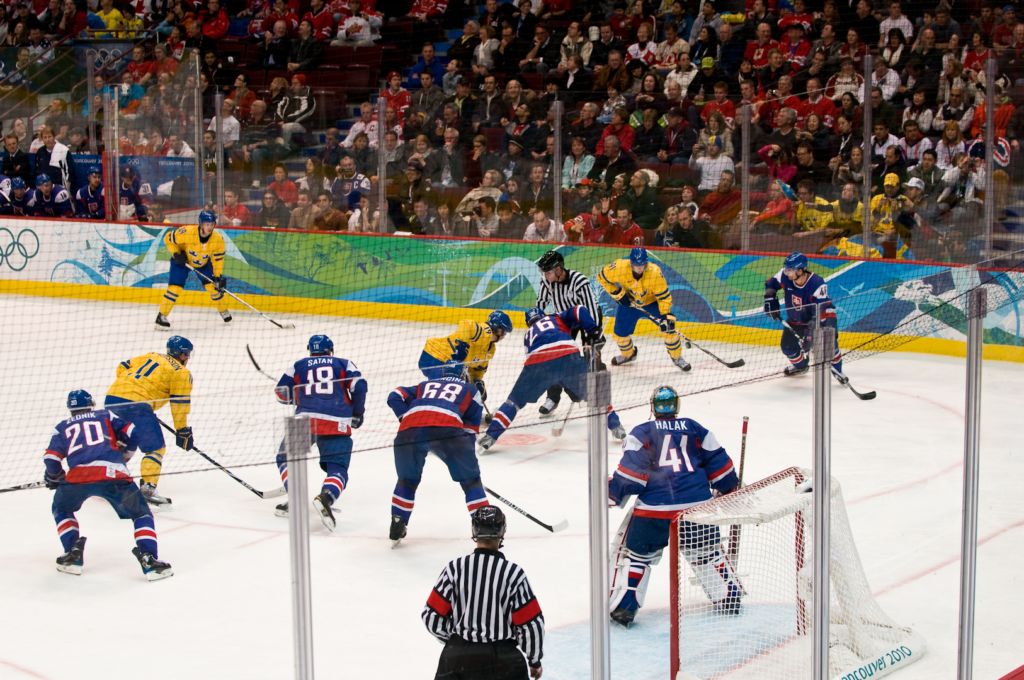‘Protesting as an athlete during the Winter Olympics can have an adverse effect’
-
 Ice-skating medallists’ podium at the Winter Olympics in Sochi in 2014. Photo: Andy Miah / Flickr
Ice-skating medallists’ podium at the Winter Olympics in Sochi in 2014. Photo: Andy Miah / Flickr
The Winter Olympics in Beijing, due to start on Friday, are not uncontroversial. However, historian Paul Reef, who is researching protests concerning sports tournaments, doesn't believe that many athletes will dare to make a statement. 'The risks are too great.'
Beijing is the first city in the world to host both the Summer Olympics (in 2008) and the Winter Olympics. Authoritarian states that play fast and loose with human rights seem to like organising large sports tournaments: the Winter Olympics took place earlier in Sochi in Russia and the next World Cup football will take place in Qatar.
‘That has always been the case’, explains Paul Reef. The historian is doing research into protests happening around large sporting events such as the Olympic Games and World Cup football and how the International Olympic Committee (IOC) and international football association FIFA deal with them.

‘In principle, every country may organise that kind of sporting event’, says Reef. ‘A few cautious guidelines have been introduced in recent years with regard to dealing with human rights but that isn’t much more than window dressing as yet.’
According to Reef, western democracies rarely feel like hosting such a large event because of the hefty price tag. ‘Admittedly, the following Olympic Games are in Paris and Los Angeles, but they were also the only candidates. In cities such as Munich, Calgary and Krakow, there was no enthusiasm for organising the Winter Olympics. Conversely, in authoritarian states such as Qatar, Russia and China, there seems to be an increasing urge to organise a large international tournament.’
Why is China so eager to organise these Winter Olympics?
‘To show that it is a world power, in the same way that Russia or Japan did in the past. The Olympics, with modern stadiums and huge media coverage, put your country on the map. Also, the Chinese want to demonstrate how they have tackled the corona crisis better than other countries. Numbers of infections went through the roof in Tokyo during the Olympic Games.’
Activists are calling on athletes to make a gesture with their hands in the shape of a C. It’s a way of raising the subject of China’s violation of human rights, in particular the Chinese regime’s persecution of the Uyghur people. Is making political statements at the Olympics a recent phenomenon?
‘Actually, it isn’t. It was already happening in the 1960s. The best-known example is that of the 200-metres runners Tommie Smith and John Carlos, who raised their fists while standing on the podium at the 1968 Olympics to raise the subject of racism. Their action was severely penalised by the IOC at the time: they had to return their prize money and were banned from ever taking part in the Olympics again.’
‘Making statements on a large scale only really started happening in the last five years’
‘And in the 1980s, a few athletes from the US and Europe, including Ruud Gullit, spoke out against apartheid in South Africa. But in the last few years, there has been an enormous increase in the number of athletes who have joined the Black Lives Matter movement. Making statements on a large scale only really started happening in the last five years.’
Why is that?
‘The emergence of social media has allowed athletes to express themselves more strongly. They have become financially more independent too, which gives them the freedom to do so. Sponsors such as Nike encourage that protest nowadays, something they didn’t do before. And there has been a social shift: we expect athletes to voice their opinion about something. Moreover, there is now a generation of athletes who more often want to express themselves politically – and are able to do so. Because athletes have protested against racism in huge numbers in recent years, sports organisations now allow certain forms of protest and in doing so, move cautiously with the shift in society. Not only that, but sports associations such as the IOC have rhetorically embraced human rights.’
How risky is it for athletes to make a statement against the Chinese government from the podium?
‘Article 50.2 of the Olympic Charter states that no form of religious or political propaganda whatsoever is permitted at the Olympic Games. During the Games in Tokyo, the IOC athlete’s committee advocated new guidelines: athletes should be allowed to express their opinions on Olympic values such as peace, friendship and equality as long as those opinions are not aimed at a specific country. However, those guidelines were not incorporated into the Olympic Charter. Not only that, but the Chinese government has stated that any matters that contravene Chinese law will be punished, although it’s unclear how that would work for international athletes.’
That all sounds really discouraging.
‘I would be surprised if the Chinese government were to arrest protesting athletes with the whole world watching, and international athletes even more so, but we already have a precedent with Peng Shuai (Chinese tennis player who accused former Vice President Zhang Gaoli of rape, ed.), an internationally known athlete who disappeared for a while in China.’
‘The C-gesture is clever: it could be a gesture of solidarity, a political protest or a protest against human rights violations. But I think that despite earlier rhetoric about human rights, the IOC will identify it as a political statement, certainly under pressure from the Chinese government. Athletes who do it may be disqualified, have to pay back prize money or may be banned from ever competing in the Olympics again. I don’t think they’re prepared to take that risk and sports associations are advising against it too. And even if they do make the gesture, there’s no way of knowing if their action will make it onto Chinese state television: the organisers will simply switch to another camera.’

Have past protests by athletes ever changed anything in the politics of a host country?
‘Never directly as yet. There is no clear correlation between an athletes’ protest and the politics of a host country. The rainbow-coloured gloves worn by snowboarder Cheryl Maas in Sochi have changed nothing about Russian politics with regard to homosexuality. On the contrary: actions by athletes can have an adverse effect. ‘You see, the whole world is against us’ – that kind of reaction. Although it might inspire the inhabitants of a country, or give activists the courage to continue. And the Black Power protest and the protest by boxer Muhammad Ali against the Vietnam war did generate international attention for certain problems.’
There are often also protests from environmentalists specifically against the Winter Olympics.
‘There is now a growing awareness of the impact sports have on climate, but resistance against damage to nature is much older. As far back as 1932, at the Winter Olympics in Lake Placid (in the American state of New York, ed.), there were protests against the construction of a bobsleigh track in a forest. In 1976, the Winter Olympics were originally to take place in Denver, Colorado, in a number of locations where no snow falls and therefore artificial snow would have had to be made. A coalition of protesters forced a referendum and in the end, the Games were moved to Innsbruck, in Austria. From the late 1960s, some cities failed to be successful in their candidature due to pressure from citizens or NGOs.’
‘In order to have enough artificial snow, huge amounts of groundwater are extracted from the earth’
‘In the nature reserve to the north of Beijing, it’s between 3 and 4 degrees this month; there’s no snow and very little rain. In order to have enough artificial snow, huge amounts of groundwater are extracted from the earth. And mountainsides are deforested for ski slopes. That’s an ecological disaster that will resonate for decades to come. The discussions often focus on the politics of the host country, but maybe we should also be talking about the ecological damage caused by the sport itself. Sports associations could demand from the host country that the Games be organised in a genuine winter sports region, or that only limited new infrastructure be created.’
Will you be watching the Winter Olympics?
Reef laughs. ‘People expect that if you do research into sports, you must be a sports fan but that’s not the case. However, sports are such a huge commercial, political and cultural phenomenon, that they deserve our attention. By the way, I do like to watch curling.’



